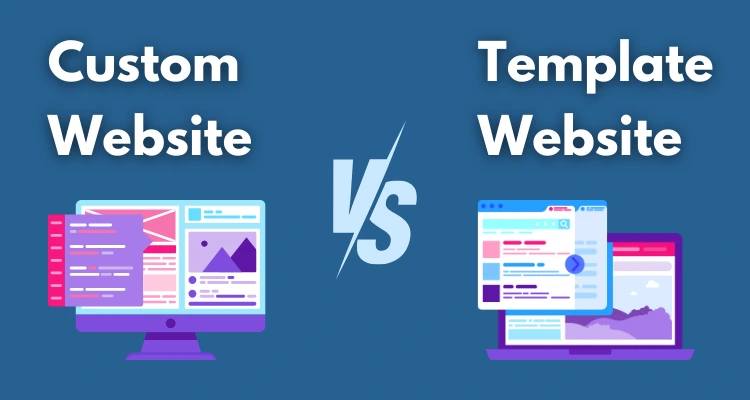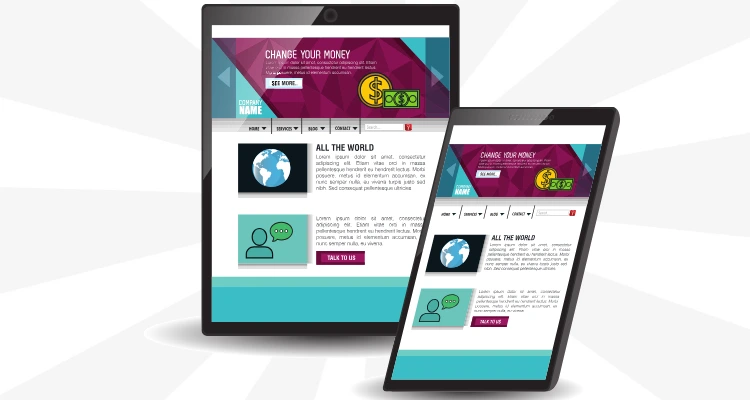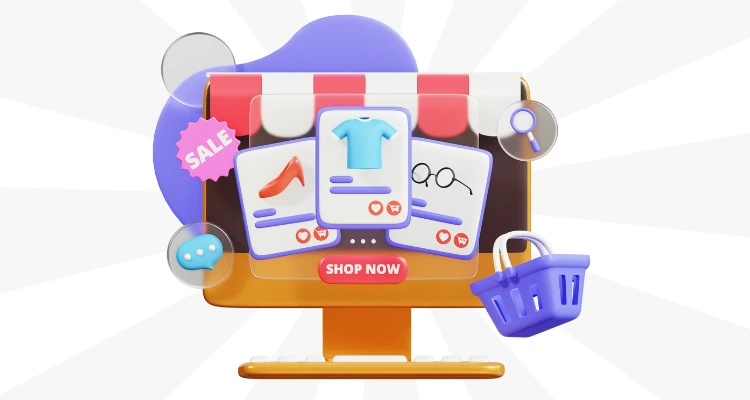- Home
- -Blog
Custom vs. Template Websites: A Simple Guide for Small Business Owners

- 06 Nov2024
- Shabir Ahmad
Introduction
What is a Custom-Built Website?
What is a Template-Based Website?
Pros and Cons of Custom-Built Websites
Pros and Cons of Template-Based Websites
Scalability Comparison: Custom vs. Template
Branding Considerations: Custom vs. Template
Functionality Breakdown: Custom vs. Template
Having a website is no longer optional for small and mid-sized businesses. It's the foundation of your online presence and a key tool for reaching new customers. A well-designed website can help showcase your products, services, and what sets your business apart.
When it comes to building a website, businesses have two main options: custom-built websites or template-based solutions. Both have their strengths and weaknesses, which can make the decision tough. Custom websites offer more flexibility, while templates provide a faster and more affordable way to get online.
The key factors that usually matter most to business owners when making this choice are scalability, branding, and functionality. How well can the website grow with your business? Will it truly reflect your brand? And, can it handle the features you need to keep your operations running smoothly?

A custom-built website is one that's created from scratch by a developer or a team of developers. It's designed specifically for a business, keeping in mind the unique needs and goals of that business. Unlike pre-made templates, everything about a custom website-from the layout to the features-is built to fit the specific requirements of the company.
When building a custom website, developers work closely with the business to understand its vision and create a site that not only looks good but also functions exactly how the business needs it to. This might include specific design elements that align with the brand or unique features that improve how customers interact with the site. Whether you outsource web development projects to an agency or hire in-house web developers, collaboration is a must in custom-built websites to ensure that they align with the business objectives.
Common features of custom websites include flexibility and personalized design. The flexibility allows businesses to add or change features as they grow, while personalized design ensures the website truly reflects the brand's identity and stands out from competitors.

A template-based website is a pre-designed website that can be quickly set up by choosing a layout from a library of options. These templates come with basic structures, and businesses can customize them by adding their own content, images, and branding.
Since the design and layout are already created, these websites require less time and technical skill to set up. Most template-based platforms allow users to make minor adjustments like changing colors, fonts, and adding logos, but the overall structure remains the same.
Some of the popular platforms offering template-based websites include WordPress, Wix, and Squarespace. These platforms are known for being user-friendly, especially for small businesses that need to get online fast and at a lower cost.
| Pros of Custom-Built Websites | Cons of Custom-Built Websites |
|---|---|
| Scalability: Can easily grow and adapt to the business. | Cost: Higher upfront investment compared to templates. |
| Unique Branding: Full control over design, making your business stand out. | Time: Longer development time, sometimes weeks or months. |
| Functionality: Custom features tailored to specific business needs. | Maintenance: Ongoing support is needed for updates and fixes. |
| Flexibility: Allows for any design or feature, no restrictions. | Developer Dependency: Requires professionals for changes or updates. |
| Optimized Performance: Built for fast load times and a smooth user experience. | Complex Process: Requires detailed planning and input, which can be overwhelming for some businesses. |
| SEO Friendly: Can be optimized for better search engine performance from the start. | Higher Risk of Initial Errors: May encounter more bugs during development stages. |
| Security: Developers can implement advanced security measures specific to your business. | Long-Term Costs: Often needs more investment over time for updates and improvements. |
| Custom Integrations: Easily integrates with external tools or software that the business needs. | Requires Clear Communication: Business must clearly communicate needs to avoid costly redesigns. |
| Full Ownership: Complete control over the code and structure of the website. | Harder to Change Quickly: Immediate changes can be harder to implement without a developer. |
| Advanced Analytics Setup: Can support detailed analytics and tracking for business insights. | Requires Technical Knowledge for Management: Non-technical users may struggle without ongoing developer assistance. |
| Mobile Optimization: Custom design ensures full optimization for mobile devices. | Not Ideal for Tight Deadlines: If you need a website urgently, custom may not be the best option. |
| User Experience (UX): Craft the user journey exactly how you want for maximum engagement. | Upfront Planning Required: Careful planning and wireframing needed before development starts. |
| Pros of Template-Based Websites | Cons of Template-Based Websites |
|---|---|
| Affordability: Lower cost, making it a budget-friendly option. | Limited Customization: Restricted to the design and features provided by the template. |
| Quick Setup: Can be launched quickly, often in a few hours or days. | Scalability Limits: Difficult to expand the website with advanced features or additional pages. |
| User-Friendly: No coding skills required; easy for non-developers to manage. | Generic Look: Many businesses use the same templates, leading to less uniqueness. |
| Pre-Designed Layouts: No need to create layouts from scratch; options are ready to use. | Functionality Restrictions: Limited ability to add complex features or integrations (e.g., custom booking systems). |
| Maintenance-Free: Basic platform maintenance is often handled by the service provider. | Performance Issues: Templates may not be fully optimized, leading to slower load times. |
| Multiple Design Choices: Many template platforms offer a range of design styles to choose from. | Lack of Flexibility: You may not be able to move elements around freely or change certain parts of the design. |
| Built-In Features: Common features like blogs and galleries are usually included. | SEO Limitations: Not always built with SEO best practices in mind, limiting organic growth potential. |
| Mobile-Responsive: Many templates come pre-built for mobile devices. | Limited Support: Custom support is usually minimal, and you may be limited to general help articles. |
| No Developer Required: Most platforms offer drag-and-drop builders for easy design. | Security Risks: Templates shared across many users may have vulnerabilities that affect all sites on the platform. |
| Pre-Integrated Tools: Many templates offer easy integration with social media and basic analytics tools. | Subscription Costs: Over time, platform fees or add-ons can increase, making it more expensive in the long run. |
| Easy to Update: Updating content or adding new blog posts is simple for non-technical users. | Not Fully Customizable: You can't change the underlying structure of the website, so custom needs may be hard to implement. |
| Minimal Learning Curve: Templates are intuitive, so you can get started quickly without much training. | Over-Dependence on Platform: If the platform changes or discontinues a feature, it could impact your website. |
| Access to Plugins/Add-ons: Many platforms offer easy access to plugins for extra functionality (e.g., SEO tools, e-commerce). | Difficulty Standing Out: Template-based websites often look similar, making it hard to distinguish your brand from others using the same design. |
When it comes to scalability, custom-built websites have a clear advantage. Since they are built from the ground up with your business in mind, they can easily grow as your business expands. Whether you need to add new pages, features, or even entire sections, a custom website is designed to handle it. This is especially important for businesses that expect rapid growth or need to integrate specialized tools like e-commerce platforms or booking systems. Custom sites can be upgraded and expanded without major limitations.
On the other hand, template-based websites can hit a wall when it comes to scalability. While they work well for small businesses starting out, they may struggle to keep up as your business grows. Many template platforms have limits on the number of pages you can add or the types of features you can implement. Adding complex functions or expanding the website beyond its basic structure may require moving to a more advanced plan or even starting from scratch with a custom site. For businesses that plan to scale up significantly, templates might not be the best long-term solution.

When it comes to branding, custom-built websites give you full control over how your business is represented online. Every element of the site- from the layout and color scheme to the fonts and images-can be designed to match your brand perfectly. You can even use a color picker to fine-tune your palette and ensure consistency across your digital presence. This means you can create a website that truly reflects your business's identity and stands out from the competition. If your business relies on strong branding to attract customers, a custom website is often the better choice.
In contrast, template-based websites come with more standardized design options. While you can make some changes like adjusting colors or adding your logo, the overall look of the site will often be similar to other businesses using the same template. This can make it harder to create a distinct brand image. For businesses that want their website to reflect their unique style and stand out visually, the limited customization of a template might not be enough.
The functionality of a website is key to how it serves your business. With a custom-built website, the possibilities are nearly endless. Developers can build features specifically for your business needs, whether it's an e-commerce platform, waterpark booking software , or custom forms for collecting specific data. You can integrate advanced tools like CRM systems, payment gateways, or any software that helps run your business smoothly. If you need a feature that's not available in standard templates, a custom site allows you to add it without limitations.
On the other hand, template-based websites are more limited in functionality. While many templates come with basic features like blogs, simple contact forms, and basic e-commerce setups, they might not support more complex integrations. Adding custom features, like a fully integrated booking system or complex forms, can be difficult or sometimes impossible without additional developer work. For businesses that rely on these kinds of functions, templates might not be the best option long term, as they could limit how effectively the site supports the business.
Conclusion
Choosing between a custom-built website and a template-based solution depends on the specific needs of your business. Custom websites offer more flexibility, allowing your site to grow with your business, fully reflect your brand, and include advanced features tailored to your operations. However, they come with higher costs and longer development times.
On the other hand, template-based websites are a more affordable and faster option, ideal for small businesses needing a simple online presence. While they're easy to set up and manage, they come with limitations in scalability, branding, and functionality.
In the end, the decision comes down to your business goals, budget, and how you plan to use your website. If your business is looking for a long-term solution with full control and room to expand, custom is the way to go. If you need a quick and budget-friendly option, templates can get the job done, but with some trade-offs in flexibility and uniqueness.



